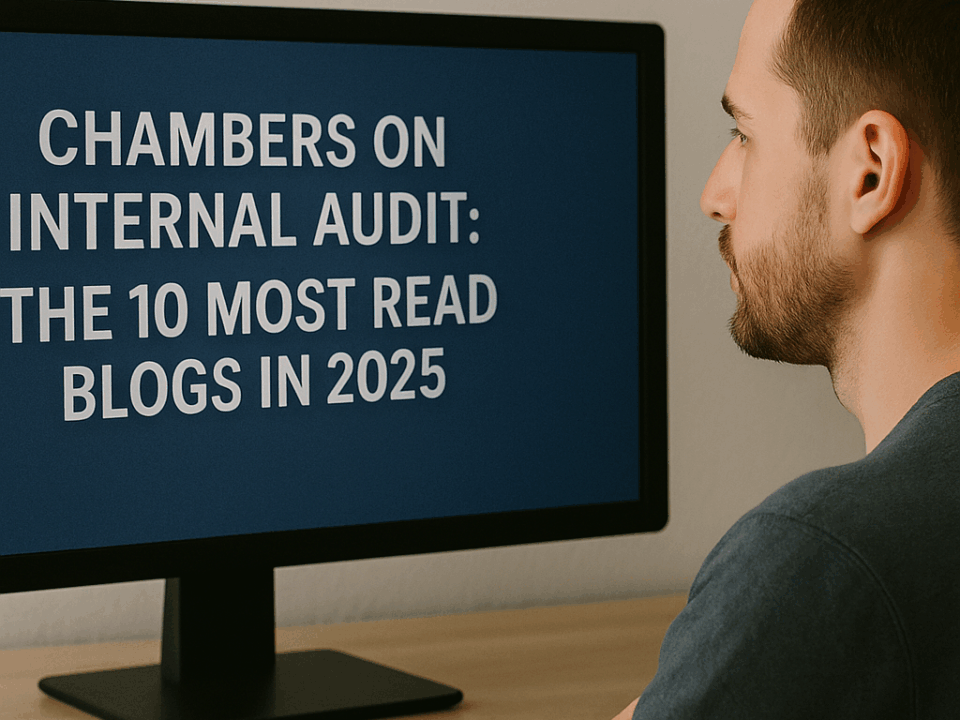
Shout-outs in Audit Reports Can be as Powerful as Findings
July 17, 2023
Professional Resilience Means Never Being Defined by Our Failures
August 2, 2023Seven years ago, I had the distinct privilege of joining several IIA colleagues on the podium of the New York Stock Exchange (NYSE) to ring the opening bell. The experience was one of the highlights of my 12 years as The IIA’s CEO. It’s a memory I cherish for many reasons, not the least of which was the NYSE’s acknowledgement of the important role internal auditors play in fostering trust in capital markets around the world.
I suspect some of you might be scratching your head asking, “How did he make that leap?” Frankly, it’s not a leap at all. In comments made to us just before the ceremony, NYSE officials said as much.
In essence, the invitation to ring the opening bell on the floor of the world’s largest stock exchange was recognition that internal auditors, who generally work behind the scenes, are instrumental in fostering trust at institutions across sectors. And that is precisely why I have long argued that internal audit serves the public interest – regardless of the institution in which it operates.
Which brings me to The IIA’s proposed “Global Internal Audit Standards” – specifically, inclusion of “public interest” in the Purpose Statement section. For those who may not have noticed, the proposed statement reads (emphasis added):
“Internal auditing enhances the organization’s success by providing the board and management with objective assurance and advice.
Internal auditing strengthens the organization’s:
- Value creation, protection, and sustainability.
- Governance, risk management, and control processes.
- Decision-making and oversight.
- Reputation and credibility with its stakeholders.
- Ability to serve the public interest.
Internal auditing is most effective when:
- It is performed by qualified internal auditors in conformance with the Global Internal Audit Standards, which are set in the public interest.
- The internal audit function is independently positioned with direct accountability to the board.
- Internal auditors are free from bias and undue influence and committed to making objective assessments.”
During the proposed Standard’s public comment period, which recently ended, there was ample critique by passionate internal audit thought leaders/advocates of the Purpose Statement – for what it did and did not include. I will leave it to The IIA’s Standards Board to evaluate the comments and refine the statement as appropriate. But what I desperately hope is that it will retain the acknowledgement that internal audit serves the public interest!
I have many vivid memories of the NYSE ceremony on June 30, 2016, but one that I have replayed in my mind many times occurred before the opening bell. We were gathered in a conference room near the trading floor when an executive of the NYSE praised the work of The IIA and indicated the pride the exchange felt in featuring us as part of that day’s proceedings. In a time when investor trust was slowly rebuilding in the wake of the great financial crisis of 2008, it was inspiring to know that the NYSE recognized internal audit’s value to the organizations it serves and its crucial role in good governance.
For many, the means by which government auditors and external auditors serve the public interest is clear. Fostering trust in government institutions and publicly available financial statements are vital to our system of government and capital markets. However, unlike government auditors, external auditors and others, the work of internal auditors in publicly traded companies is often carried out behind corporate doors and with little fanfare.
Each year, internal auditors in companies large and small around the world provide management and their boards advice and assurance on the effectiveness of risk management and internal controls. Their tireless efforts result in more efficient and effective corporate operations and reduced risks of waste, mismanagement and fraud.
Most investors are clearly motivated by increased share value and the return on their investment. But trust is a key element in decisions to invest. Investors must trust the financial information they are provided, the competence and effectiveness of management, and the diligence of boards of directors. When any or all of those fail, investors grab their money and head for the hills – often reluctant to invest again until trust is restored.
Volatility in the capital markets over the past two decades has been driven as much by wavering trust of investors as any other factor.
I agree with former Australian Prime Minister Kevin Rudd who observed, “The stability of global financial markets is a public good.” For more than a decade, I have been arguing that internal auditors in the corporate sector serve the public interest by fostering trust in the capital markets. By providing management and boards with timely and relevant assurance and insights on risk, control and governance, internal auditors help their companies earn and maintain the trust of investors that is so vital to the success of the companies and, ultimately, the capital markets.
Author Frank Sonnenberg observed, “Trust is like blood pressure. It’s silent, vital to good health, and if abused it can be deadly.” Internal auditors are vital to maintaining the kind of corporate health to which Sonnenberg refers.
As I have observed before, distrust in the corporate sector is often brought on by C-suite executives who become disconnected from the plight of the average worker, boards who defer to management rather than provide true oversight, and misaligned or toxic cultures. The need for independent, strong and well-resourced internal audit functions has never been more critical.
In a blog celebrating the NYSE event, I urged internal auditors to undertake self-appraisals to ensure they are serving their companies to the best of their abilities. Some key questions in this self-appraisal should include:
- Are reporting lines to management and the audit committee clear and distinct? A clear separation of administrative and functional reporting supports internal audit independence.
- How strong is the current relationship with management and the board/audit committee? Strong communications and trusting relationships are integral to good governance.
- How are audit recommendations viewed by management, and how readily are they implemented? This serves as a solid barometer of management’s desire to “do the right thing” to ensure a sustainable future for the company and maintain shareholder trust.
- Is internal audit sufficiently resourced to address the risks of the organization properly? This is another measure of the organization’s commitment to good governance.
- Does the audit committee take the lead in the CAE’s hiring, firing, review, and compensation? Too often, these responsibilities are abdicated to management, which can erode internal audit independence.
The IIA ringing the opening bell at the NYSE in 2016 should have been a clarion call for internal auditors — and not only those in publicly traded companies — to embrace their role in building and maintaining trust of and within their organizations.
To be sure, progress has been made, but much remains to be done as we quietly go about serving the public interest in our companies and in capital markets around the world.
What are your thoughts on internal audit’s service of the public interest? Share them with me on LinkedIn or Twitter, or drop me an email at blogs@richardchambers.com.






I welcome your comments via LinkedIn or Twitter (@rfchambers).